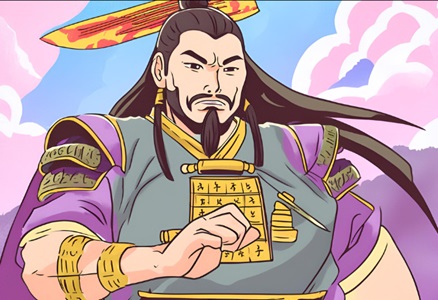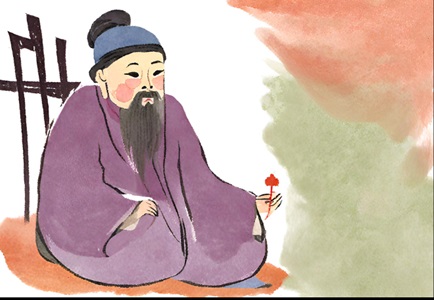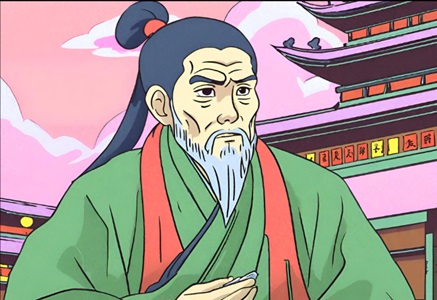Title of Biography in Chinese, Pinyin: 墨子传 (Mòzǐ Zhuàn).
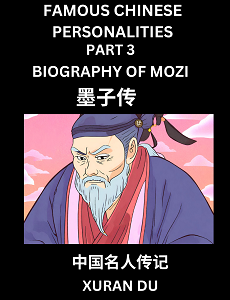
Title of Biography in English: Mozi: Ancient Thinker and Advocate of Peace.
Check out books on my Amazon and Barnes & Noble homepages as well as the following pages to learn Biographies of famous Chinese personalities-
- Part 1 – Chinese Biography Book Series for Beginners
- Part 2 – Chinese Biography Book Series for Beginners
- Part 3 – Chinese Biography Book Series for Beginners
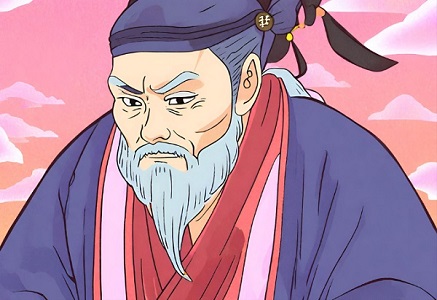
The Biography of Mozi in English (英文传记)
Mozi, also known as Di, was a renowned thinker, philosopher, scientist, and strategist of the Warring States period. He founded the Mohist school of thought, advocating universal love, non-aggression, respect for the wise, and unity of values.

Living in the turbulent Warring States era, Mozi deeply felt the cruelty of war and the suffering of the people. Therefore, he proposed the philosophy of universal love and non-aggression, advocating mutual care among people and opposing unprovoked wars and violence. He believed that only through peaceful means could true harmony and stability be achieved.
Apart from his political views, Mozi also made significant contributions in the field of technology. He was proficient in mechanical engineering and invented various practical tools and devices. Furthermore, he studied optics and mechanics, putting forward many unique insights and theories.
In education, Mozi advocated equal education, believing that everyone should have access to education. He advocated teaching students according to their aptitudes and emphasized the cultivation of practical abilities, providing valuable experience for the educational cause of later generations.

Mozi’s thoughts had a profound impact at that time, and his doctrines were widely applied in social life and political practice. Although the Mohist school gradually declined later on, the thoughts and spirit of Mozi forever remain in the cultural genes of the Chinese nation.
Learn Biography Of Mozi in Chinese (墨子的详细传记)
墨子,名翟,战国时期著名的思想家、哲学家、科学家和军事家。他创立了墨家学派,主张兼爱非攻、尚贤尚同,倡导和平与平等。

墨子生活在动荡的战国时期,他深感战争的残酷和人民的疾苦。因此,他提出了兼爱非攻的思想,主张人与人之间要相互关爱,反对无端的战争和暴力。他认为,通过和平的方式解决问题,才能实现真正的和谐与稳定。
除了政治主张外,墨子在科技方面也有诸多贡献。他精通机械制造,发明了多种实用的工具和器械。同时,他还研究了光学和力学等领域,提出了许多独特的见解和理论。
在教育方面,墨子主张平等教育,认为每个人都应该有接受教育的机会。他提倡因材施教,注重实践能力的培养,为后世的教育事业提供了宝贵的经验。
墨子的思想在当时产生了深远的影响,他的学说被广泛应用于社会生活和政治实践中。虽然墨家学派在后来逐渐衰落,但墨子的思想和精神却永远地留在了中华民族的文化基因中。
Mozi Biography Keywords- English, Chinese & Pinyin (关键词)

- 墨子(Mò Zǐ): Mozi, the protagonist of the biography.
- 墨家学派(Mò Jiā Xué Pài): Mohism, the school of thought founded by Mozi.
- 兼爱非攻(Jiān Ài Fēi Gōng): Universal Love and Non-Aggression, Mozi’s core political philosophy.
- 尚贤尚同(Shàng Xián Shàng Tóng): Respect for the Wise and Unity of Values, a political ideal advocated by Mozi.
- 机械制造(Jī Xiè Zhì Zào): Mechanical Manufacturing, one of Mozi’s areas of technological expertise.
- 平等教育(Píng Děng Jiào Yù): Equal Education, an educational principle advocated by Mozi.
Pinyin of Mozi Biography (墨子传记的拼音)

Mò zi, míng dí, zhànguó shíqí zhùmíng de sīxiǎngjiā, zhéxué jiā, kēxuéjiā hé jūnshì jiā. Tā chuànglìle mòjiā xuépài, zhǔzhāng jiān ài fēi gōng, shàng xián shàng tóng, chàngdǎo hépíng yǔ píngděng.
Mò zǐ shēnghuó zài dòngdàng de zhànguó shíqí, tā shēn gǎn zhànzhēng de cánkù hé rénmín de jíkǔ. Yīncǐ, tā tíchūle jiān ài fēi gōng de sīxiǎng, zhǔzhāng rén yǔ rén zhī jiān yào xiānghù guān’ài, fǎnduì wúduān dì zhànzhēng hé bàolì. Tā rènwéi, tōngguò hépíng de fāngshì jiějué wèntí, cáinéng shíxiàn zhēnzhèng de héxié yǔ wěndìng.
Chúle zhèngzhì zhǔzhāng wài, mò zi zài kējì fāngmiàn yěyǒu zhūduō gòngxiàn. Tā jīngtōng jīxiè zhìzào, fāmíngliǎo duō zhǒng shíyòng de gōngjù hé qìxiè. Tóngshí, tā hái yánjiūle guāngxué hé lìxué děng lǐngyù, tíchūle xǔduō dútè de jiànjiě hé lǐlùn.

Zài jiàoyù fāngmiàn, mò zi zhǔzhāng píngděng jiàoyù, rènwéi měi gèrén dōu yīnggāi yǒu jiēshòu jiàoyù de jīhuì. Tā tíchàng yīncáishījiào, zhùzhòng shíjiàn nénglì de péiyǎng, wèi hòushì de jiàoyù shìyè tígōngle bǎoguì de jīngyàn.
Mò zi de sīxiǎng zài dāngshí chǎnshēngle shēnyuǎn de yǐngxiǎng, tā de xuéshuō bèi guǎngfàn yìngyòng yú shèhuì shēnghuó hé zhèngzhì shíjiàn zhōng. Suīrán mòjiā xuépài zài hòulái zhújiàn shuāiluò, dàn mò zi de sīxiǎng hé jīngshén què yǒngyuǎn dì liú zàile zhōnghuá mínzú de wénhuà jīyīn zhōng.
